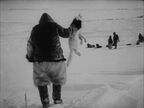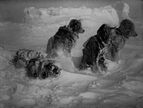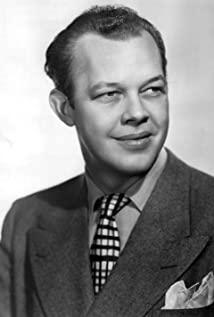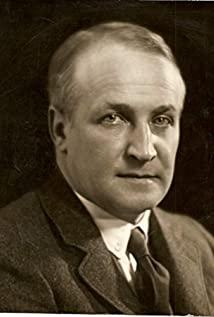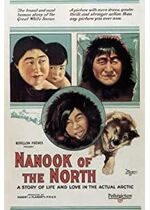-
Title Card: The mysterious Barren Lands - desolate, boulder-strewn, wind-swept - illimitable spaces which top the world. The sterility of the soil and the rigor of the climate no other race could survive; yet here, utterly dependent upon animal life, which is their sole source of food, live the most cheerful people in the all the world - the fearless, lovable, happy-go-lucky Eskimo.
-
Title Card: Nanook comes to prepare for the summer journey down river to the trade post of the white man and to the salmon and walrus fishing grounds at sea.
-
Title Card: Landing at the white man's "big igloo" - - the trading post.
-
Title Card: In deference to Nanook, the great hunter, the trader entertains and attempts to explain the principle of the gramophone - - how the white man "cans" his voice.
-
Title Card: Weighing as much as two tons and armored with an almost impenetrable hide, the walrus, when charging, tusks agleam and sounding his battle cry "uk-uk," is well called the "tiger of the North".
-
Title Card: Deep snow, packed hard by the wind, makes good ground for building the igloo, the snow dwelling of the Eskimo.
-
Title Card: So as to cut more easily, Nanook licks his walrus ivory knife, which instantly is glazed with ice.
-
Title Card: The tiny igloo Nanook made for the puppies has kept them warm all night and safe from the hungry jaws of their big brothers.
-
Title Card: The most desired of all meat is that of seal. It affords the maximum of warmth and sustenance. The "blubber-eating Eskimo" is a misconception. Blubber they use as we use butter.
-
Title Card: The shrill piping of the wind, the rasp and hiss of driving snow, the mournful wolf howls of Nanook's master dog typify the melancholy spirit of the North.
-
Robert Flaherty, Director: At last, in 1920, I thought I had shot enough scenes to make the film, and prepared to go home. Poor old Nanook hung around my cabin, talking over films we still could make if I would only stay on for another year. He never understood why I should have gone to all the fuss and bother of making the "big aggie" of him. Less than two years later I received word that Nanook had ventured into the interior hoping for deer and had starved to death. But our "big aggie" become "Nanook of the North" has gone into most of the odd corners of the world, and more men than there are stones around the shore of Nanook's home have looked upon Nanook, the kindly, brave, simple Eskimo.
Nanook of the North Quotes
-
Jarrell 2022-06-07 11:47:07
It was as shocking as watching "The Last Mountain God", feeling that this is the starting point of the documentary, a 1922 work. Is the documentary completely true? The documentary is just "poetic truth". Thinking of "the dynasty bacteria do not know the syllabus, the worms do not know the spring and autumn", will the Eskimos feel that their life is hard and barbaric? Will Nanuk, who starved to death two years later, feel that his life is sad? Probably neither, because they think that there is the whole world. What about us?
-
Amparo 2022-06-07 23:14:20
Although this documentary has performance elements and is not completely documentary, it is really interesting.


